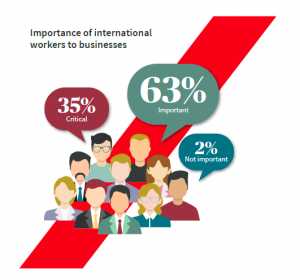
We have recently come to a point where many declaim the end of globalization as we have known it. Yet, amid this anti-globalization rhetoric, global businesses are clearly taking a different stance, arguing that more, not less, globally proficient talent is needed. A recent AXA World of Work Report, which surveyed 250 firms in eight countries, found that 63% of employers see a globally mobile workforce as important and 35% as critical when it comes to building a successful business.
While the future for global mobility seems bright, this report points to three challenges to managing global mobility and staff motivation more effectively. A first challenge is financial, and refers to the role of managing the cost of global mobility. Although there is a higher need for global talent and global work, the expenses associated with global mobility are still prohibitive. As the report points out, employers have to juggle cutting costs and attracting the best people at the same time. The report indicates that more than half (53%) of assignees are motivated by higher salaries and benefits, hence remuneration packages need to remain attractive. To address the challenge, multinationals are adopting more flexible remuneration packages, trying to tailor them to the specific needs of different assignees. The report authors note that there is an increasing trend to reintroduce allowances and expand benefits packages, which have been traditionally less flexible.
The second challenge identified in the report is a motivational challenge, which concerns the design of global work. Although multinationals want to provide assignments for developmental and skill-building purposes to their employees, many notice a trend of employees being reluctant to relocate permanently or for a longer period of time. At the same time, employees are still willing to accept jobs based in other countries; they are just looking for more variety in assignment types. For example, short-term assignments are projected to increase from 28% currently to 46% within the next five years. Moreover, there are visible trends of increases in commuter assignments and virtual work. Apart from the way of working, the motivational challenge is also telling us that employers should increasingly tailor assignment opportunities to fit the different motivations of potential assignees. Although remuneration is important, employees are also motivated to take assignment roles for career acceleration purposes (47%) and to learn new skills (45%). Thereof, employers need to make sure that they deliver on personal and professional development.
Finally, the well-being challenge relates to the resilience of staff who embark on global moves. It may seem that we are generally more global, more used to relocating and, due to internet technologies, also more connected. However, accounts of mental ill health, family maladjustment, burnout and exhaustion related to global mobility abound. As the report suggests, the top three personal reasons for early assignment termination are family concerns (1st), own health concerns (2nd), and adaptation difficulties (3rd). Given this challenge, it is comforting to see that global companies generally provide ample support for their assignees and, probably, staff are better prepared for global mobility than ever. At the same time, given the continuous emergence of new markets and destinations, as well as a quite volatile socio-political landscape, sustaining employee well-being should remain part of the global HR agenda, and be improved in terms of continuous support and systematic mentoring throughout the life cycle of a global move.
I kindly suggest that you take a closer look at the report to assess how to further leverage the role of global mobility for developing and maintaining a company’s global footprint.


The importance of mobility to business growth has increased substantially in recent years.There has been a palpable shift in the role of global mobility professionals over the past few years. Keeping high skilled and in-demand talent is critical.